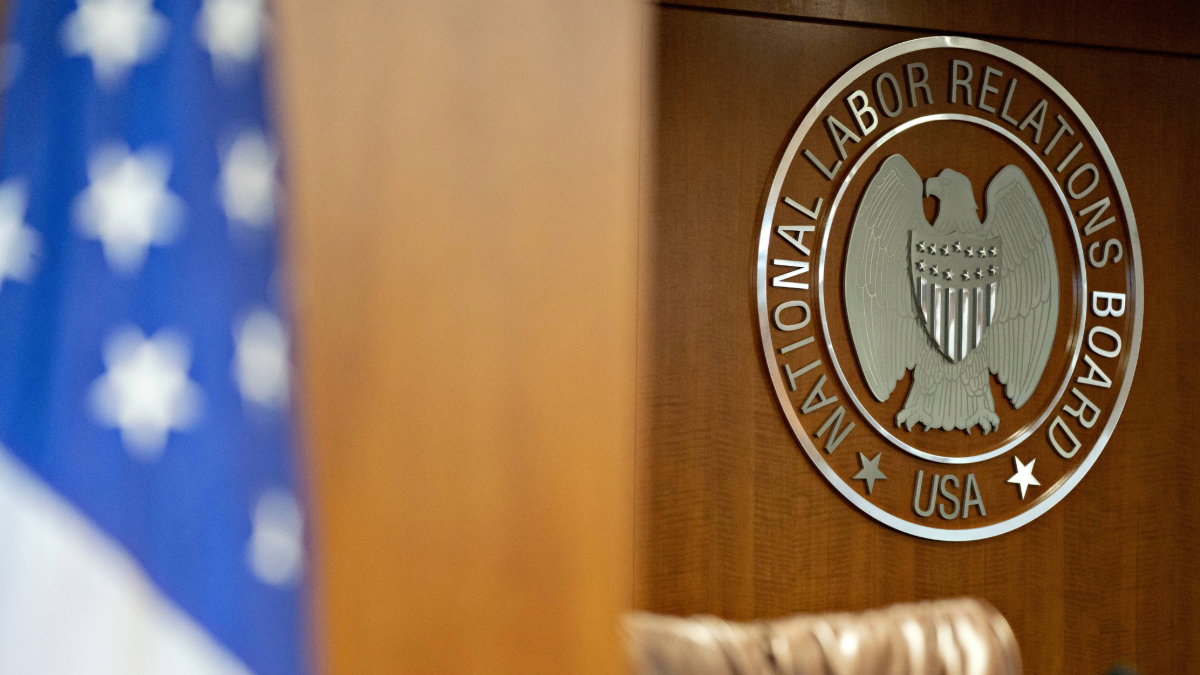A Neutered US National Labor Relations Board is a Win for Big Tech
Janneke Parrish / Jun 18, 2025
The National Labor Relations Board (NLRB) seal hangs inside a hearing room at the headquarters in Washington, DC, on Monday, Sept. 30, 2019. Andrew Harrer/Bloomberg via Getty Images
There are very few practical avenues for tech workers in the United States to seek justice when Big Tech companies violate their rights. One of the few remaining means has now been rendered powerless through the nomination of Crystal Carey as the new general counsel of the National Labor Relations Board (NLRB). Her nomination is a victory for tech firms and their billionaire owners, who seek to neuter the NLRB and prevent accountability and worker organizing across the industry.
The NLRB is a federal oversight board that ensures the implementation of the National Labor Relations Act (NLRA). Written in 1935, the NLRA sought to resolve violent conflicts between workers and employers by guaranteeing workers’ rights, including the right to organize collectively and to speak publicly about working conditions and wages. While the power of the NLRB waxes and wanes with any given presidential administration, it has nonetheless persisted as a force ensuring workers’ rights to form unions and providing a safety net against employer misconduct related to organizing workers.
I am quite familiar with the NLRB due to my personal experience. In 2021, I was one of several workers at the tech giant Apple who started advocating for our rights as workers, focusing on unfair and untenable working conditions at the company. Over the course of the summer and autumn of 2021, what became known as #AppleToo dominated the internal chat channels and communications within Apple. Our fight for equal pay, remote work, and an end to systemic shielding of abusive managers evolved into a collective worker movement, spilling out from within our chat channels and into the public media discourse.
I was one of the few public voices of the #AppleToo movement. I spoke out publicly about my experience working at Apple and the toxicity, discrimination, and retaliation I faced. I collected and published the stories of other workers who had faced similar, if not worse, conditions, and who all shared the common experience of Apple taking no action to protect them from their abusers. In response to my colleagues and me speaking to the media about our experiences, Apple took retaliatory action. In September 2021, I was placed under investigation. Two weeks later, I was fired.
I believe Apple’s termination of my employment was illegal. However, knowledge that an action is illegal is not sufficient to get justice against Big Tech. Employment attorney after employment attorney refused to take my case, saying that, even if Apple had violated my rights, the battle was impossible to win because of the depth of Apple’s resources and the inadequacies of state-level labor law. I did, however, eventually find a lawyer happy to take on Big Tech, and in November 2021, I filed a charge with the NLRB.
The allegations in the charges are numerous. My charge alleges that Apple violated the NLRA by terminating me for my protected concerted activities. It alleges that Apple surveilled me as I exercised my First Amendment rights, and that I was denied representation per the Weingarten rights. My charge, had it moved forward under the Biden administration, had the potential to set a new precedent that would have significantly extended the rights of workers in the process of organizing a union, and established new rules for what constituted employers’ suppression of workers’ rights to organize.
The charge has yet to see the inside of a courtroom. Despite NLRB charges taking an average of three to six months to investigate, my charge was sent first to Washington, DC for review, and then sat, waiting, for three years. A date for my hearing was initially set for February 2025, but this was pushed to April 2025 at the request of Apple’s counsel, Crystal Carey. After Trump’s inauguration and Carey’s nomination as the NLRB’s general counsel, my case was returned to Washington, and I was told it would be postponed indefinitely.
I believe it is not an accident that my case has been effectively cancelled after Carey’s nomination. Carey is an attorney at Morgan Lewis, a firm notorious for representing companies such as Apple, Amazon, Tesla, and SpaceX against workers. The firm has represented the interests of Musk and Bezos as they have fought against the NLRB, arguing that it is unconstitutional. With Musk, Bezos, and Big Tech interests reshaping the federal government, it seemed inevitable that, if a court would not declare the NLRB unconstitutional, it could at least be rendered impotent through the nomination of a Big Tech lackey.
The consequence is that one of the few avenues to justice for workers impacted by Big Tech’s abuses will now likely be sealed off. I am skeptical that my case will ever see the light of day. If I do not receive my day in court, Apple will not have to address the charge that it violated the NLRA. When I speak about my experience with Apple and why I blew the whistle, I will do so knowing that there will be no justice except that which can be found in the court of public opinion.
However, I also know that, in speaking up, there is a chance that another worker will understand that they are not powerless. However diminished the NLRB and the federal infrastructure protecting workers’ rights may be, it’s worth remembering that the true power lies with the people.
It is worth remembering that other avenues exist for seeking justice. The NLRA was forged out of workers standing together and fighting for their rights. In an era of new oligarchs and massive rights violations, those bases on which our rights were founded should not be forgotten. If the law can no longer protect workers, workers must protect each other and stand up to take collective action. Rights must be fought for. We must not allow our rights to be devoured by corruption.
Authors
